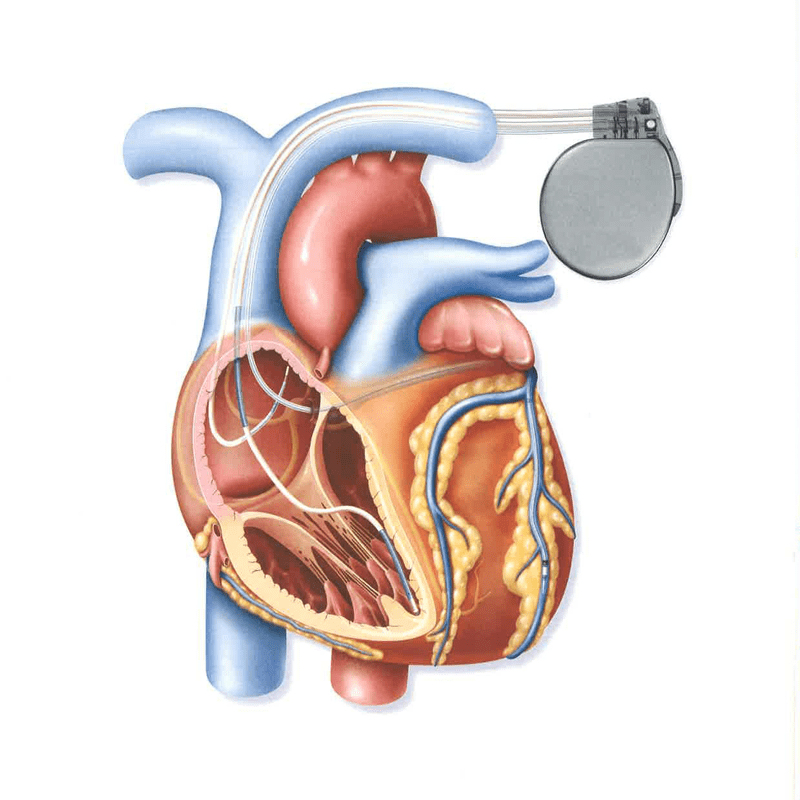
A CRT device sends small, undetectable electrical impulses to both lower chambers of the heart to help them beat together in a more synchronized pattern. This improves the heart’s ability to pump blood and oxygen to the body.
The heart device itself is actually a tiny computer, plus a battery, contained in a small titanium metal case that is about the size of a pocket watch. It weighs about 3 ounces.
In addition to the heart device, insulated wires called leads are implanted for two purposes: to carry information signals from your heart to the heart device, and to carry electrical impulses to your heart.
The CRT devices that have a defibrillator are typically referred to as a Cardiac Resynchronization Therapy Defibrillator or CRT-D. The CRT portion of the device coordinates the beating of the left and right ventricles so that they work together more effectively to pump blood throughout the body. However, when it senses a dangerous abnormal heart rhythm (arrhythmias), it will attempt to shock the heart back into a normal rhythm.
Implantable Devices
Implantable Devices
Implantable Devices
Dr Pipin Kojodjojo specializes in cardiac electrophysiology and management of heart rhythm disorders in both adolescents and adults.
Experienced in managing patients with atrial fibrillation and unexplained blackouts (syncope).
Dr Chuang Hsuan-Hung is a heart failure intensivist trained in advanced cardiovascular imaging. He specialises in heart failure and heart transplant intensive care.
Experienced in managing genetic heart disease, cardio-oncology and sports cardiology.
Dr Stanley Chia is an interventional cardiologist with a distinguished academic record.
He is skilled and experienced in managing complex cardiovascular disease and difficult coronary interventional procedures like stenting of the left main artery.
Dr Jeremy Chow is an electrophysiologist specialising in the implantation and management of electronic cardiac devices.
Experienced in arrhythmia management, stroke prevention and trained in procedures such as electrophysiology studies and ablations.
Dr Tan Chong Hiok is an interventional cardiolgist trained and specialises in stenting of the left main artery and chronic total occlusion.
He is experienced in managing complex cases in patients who have declined or are unsuitable for bypass surgery.
Dr Goh Ping Ping is an echocardiologist trained in imaging of the heart.
She is a strong advocate of preventive cardiology and awareness for women’s heart health. She manages a broad spectrum of cardiovascular disease including heart attack patients.
Dr Chan Wan Xian is a heart failure intensivist specialised in managing complex heart failure and patients with mechanical hearts.
Trained in cardiac imaging and she is experienced is treating women at risk of heart disease, especially during pregnancy.
Dr Edgar Tay is an interventional cardiologist specialised in structual heart disease, adult congenital and pulmonary hypertension.
Trained in procedures like TAVI, Mitralclip and pulmonary angioplasty for chronic thromboembolic pulmonary hypertension.
Dr Cliff Wong is an echocardiologist trained in imaging of the heart.
He specializes in cardiac imaging (echocardiography and cardiovascular computed tomography). Experienced in managing cardiomyopathy, heart failure, valvular heart diseases and cardio-oncology.
Book an Appointment